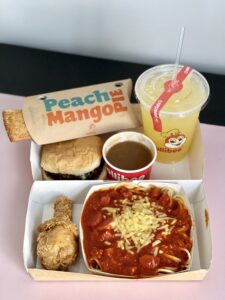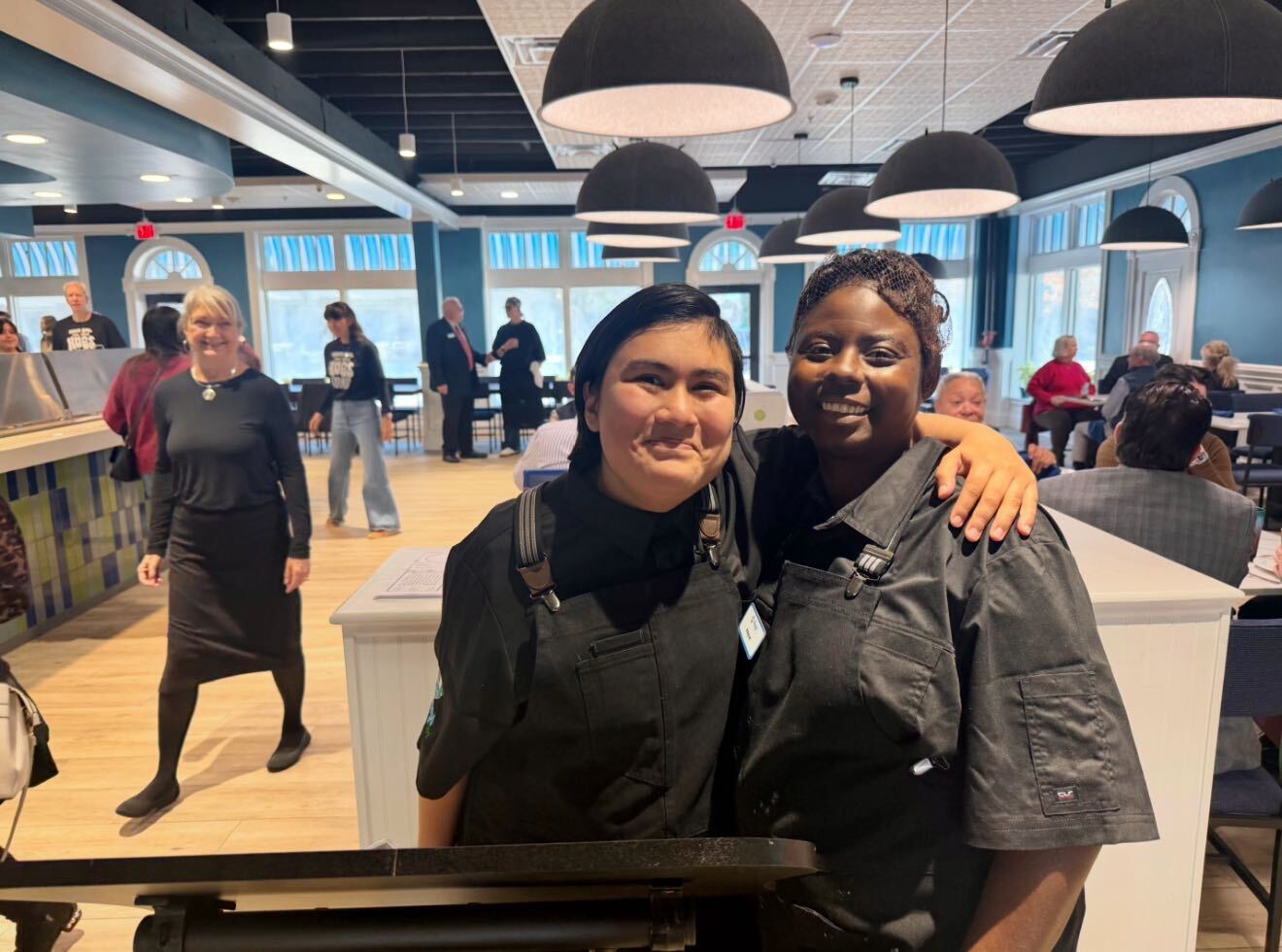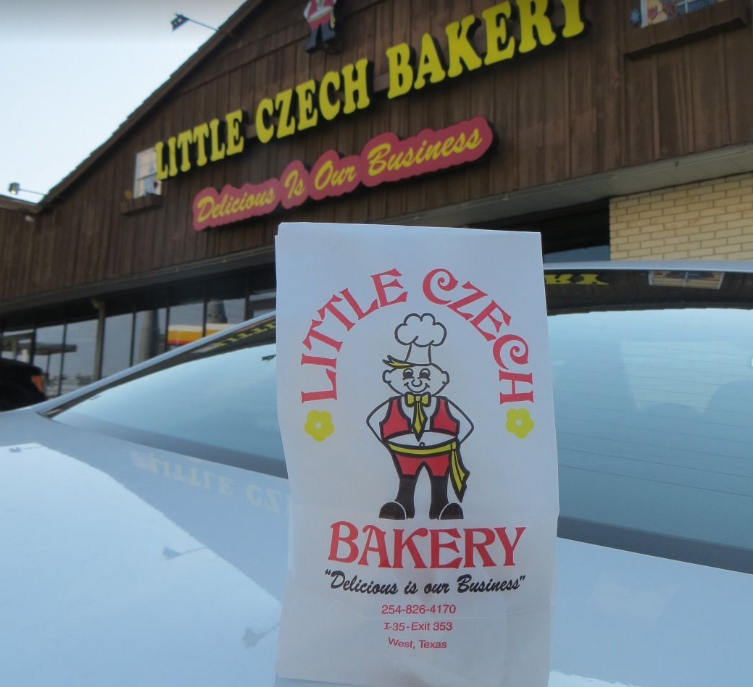( Jersey City, N.J.) —In the congested street of Fairview in Metro Manila, there stands a six-foot-tall, red-and-yellow statue of a smiling bee. He beckons me to the popular restaurant known as Jollibee, promising Chickenjoy and other Filipino-inspired fast-food specialties. It’s not the typical Filipino dishes I grew up with at home, but who turns down a smiling bee?
Fast forward six months and an ocean away from Manila. I am strolling the streets of my new neighborhood in Jersey City and, here again, is Jollibee beckoning me into his restaurant for those familiar Filipino-but-not-so-Filipino dishes.

Max’s Restaurant along Newark Ave., Jersey City [Credit: Michelle De Pacina]
The Jolly Bumblebee
Jersey City is home to New Jersey’s biggest concentration of Filipinos and “the restaurants, bakeries, and stores they support capture a culture that’s struck an amiable balance with America,” according to Saveur magazine.
As I was seeking a taste of home, I noticed Filipino restaurants and bakeries scattered across Jersey City. For example, on Newark Avenue, I found the Philippine Bread House, where traditional Filipino breads and cakes are produced, and Max’s Restaurant, which serves its signature fried chicken along with other traditional Filipino dishes.
But in my search for Filipino food, the jolly bumblebee seemed to be the most popular to Filipino-Americans. Jollibee is the largest fast-food chain brand in the Philippines. It is most known for its sweet-style spaghetti and its hand-breaded, fried chicken.
The multinational chain opened its first flagship store on Danforth Avenue in 2012. Its great success brought two more stores amidst the pandemic, including its largest outpost in Jersey City at Journal Square in 2020, according to Jersey Digs.
Video: What is Filipino Cuisine?
The air feels cooler and the road sounds calmer at Journal Square as compared to my neighborhood in Metro Manila, but as I enter Jollibee I feel as if I’m back home. It’s not just the aroma of the Chickenjoy, but I quickly notice that its tables and murals are the exact replicas of what you would find in the same restaurant in the Philippines.
Today, with more Jollibee franchises in Jersey City, it sets a cultural shift to my community.
Nicole Caballero, 30, is an avid, Filipino-American customer of Jollibee. She recalls lining up with her friends at the restaurant when it first opened in Danforth Avenue.
“It was a very nostalgic experience for me,” Caballero tells me. “I was more excited about being able to relive the Jollibee experience because I hadn’t been able to for a year or two back then.”
While Caballero was born and raised in Jersey City, she would visit the Philippines almost every year. Her trips and her interest gave her more than a layperson’s knowledge of Filipino culture and cuisine.
“I have a lot of Filipino friends who were born here and have never been to the Philippines so it was kind of a taste of back home that they never got to experience before,” says Caballero.
A Small Spectrum of the Filipino Cuisine
While Jollibee’s success in Jersey City is special for the Filipino-American community, many argue that it does not represent Filipino cuisine. Amy Besa, the co-author of “Memories of Philippine Kitchens” and co-founder of the Purple Yam restaurant in Brooklyn, says America introduced fast foods such as fried chicken and hamburgers in the Philippines. While her Purple Yam restaurant captures the lost memories of Filipino immigrants, Jollibee represents “the commercial aspect of the food industry that looks to profit from food that tries to replicate comfort food,” she tells me.

Jollibee’s Chickenjoy, Spaghetti, Peach Mango Pie, Yumburger and Pineapple Quencher [Credit: Michelle De Pacina]
Foods like Jollibee’s spaghetti and pie represent “a westernized reproduction of our food in a fast-food setting,” says Besa. She believes that Filipino cuisine is anchored in Filipino values of cooking in an environment in which food is shared in a hospitable setting to build a community.
Besa has spent years exploring the traditions of Filipino food and culture. She tells me that Filipino food has been around in the United States possibly as early as 1927 when the Americans recruited Filipino men to work in the agricultural fields.
Although Caballero agrees that Jollibee is very limited in what it represents in the entire spectrum of the Filipino cuisine, she believes that the presence of Jollibee is a good way to be introduced to the Filipino culture.
“It’s a good foundation for people who have never had Filipino food to start there and then want to explore other authentic Filipino cuisines,” says Caballero.

Manila Ave. street sign in Jersey City [Credit: Michelle De Pacina]
My quest for Filipino food and culture in the Garden State led me to urge my brother, Mark De Pacina, who has lived in Hudson County for over 10 years, to drive around Jersey City in search of Filipino restaurants. We visited West Side Avenue where you can find homemade Filipino dishes like the Chicken Adobo from family businesses such as Rowena’s Delight Cake House and Jayhan’s Grill.
“These places in Jersey City that are family businesses or restaurants still have that authentic Filipino taste. It’s not a fusion. It’s not any Americanized menu,” my brother tells me.
Besides ordering from Filipino restaurants, my brother also loves cooking. He tells me how his friends love his Lumpiang Shanghai, a Filipino egg roll with a filling of ground pork and vegetables.
While Mark was expounding on his love for Filipino food, we drove by Manila Avenue where I was surprised to see a small Philippine Plaza.
According to Balitang America, a news program on ABS-CBN’s The Filipino Channel, an influx of Filipino immigrants began in Jersey City in the 1970s and later established the Congress of Filipino American Citizens.
The organization gave the Filipino immigrants a voice by holding cultural and social events. Based on New Jersey’s Asian Population, the Filipino population in Jersey City is over 16,000 in 2012, the latest year for which data was available. One of the community’s greatest accomplishments was renaming the city’s “Grove Street” to “Manila Avenue” in January 1980. In 1992, the Philippine Plaza located on Manila Avenue was founded and dedicated to the Philippine American Veterans of all wars.
My discovery of the Filipino restaurants and the Philippine Plaza opened my eyes to Jersey City’s acceptance and pride of the Filipino culture.
‘Always Been Our Big Thing’
For years food writers have been heralding Filipino cuisine as “The Next Big Thing” in outlets as diverse as Vogue (2017), Today (2012) and Bloomberg (2017).
The prophecy doesn’t sit well with the restaurant owners I talked to.
“Filipino food is always said to be the next big thing. But to us, it has always been our big thing,” says Celeste Roldan Ferrer, the manager and owner of Max’s Restaurant in Jersey City.

Philippine Plaza Memorial Park in Manila Ave., Jersey City [Credit: Michelle De Pacina]
“Max’s has not only solidified our Filipino community in our immediate Jersey City area but has also brought together Filipinos across the eastern seaboard,” says Ferrer. “We are looking to complement other restaurants and especially other Filipino restaurants. The more restaurants the community has, the more Filipino food can be shared at the dinner tables.”
Besa, the author who has spent years exploring Philippine kitchens, discourages Filipinos from comparing their culture to others. She explains that Filipino food must be understood in its own unique historical context, which is different from other international cuisines.
“What we have to do is appreciate what Filipinos have done,” she says. “There has already been an explosion of Filipino food being expressed and articulated by Filipinos.”
It’s not about having as many restaurants as other cuisines, she says, but how restaurants “fulfill the needs of our community.”
“Filipino cuisine is a culmination and a by-product of so many different regions and cultures,” says Caballero, noting its strong connection to Spanish, American and Chinese influences. “All these different cultures that are present in the Philippines have influenced the cuisine itself. Not only is it internationally influenced, but each region (in the Philippines) also has its own spin on the dishes.”
Spotting that giant smiling bee in my Jersey City neighborhood, had me worried that Filipino food had lost its taste as it traveled to America. But Besa and my walkabout assured me that Filipinos are masters at incorporating flavors from other cuisines while preserving their own.
“You will never get rid of those basic traditional Filipino dishes because they’re a part of you, and you will preserve it by cooking or eating it,” she says. “Whenever you eat something, you’re preserving it. When you preserve something, you’re showing a preference and a preference has a market value. The act of eating is your best defense.”

